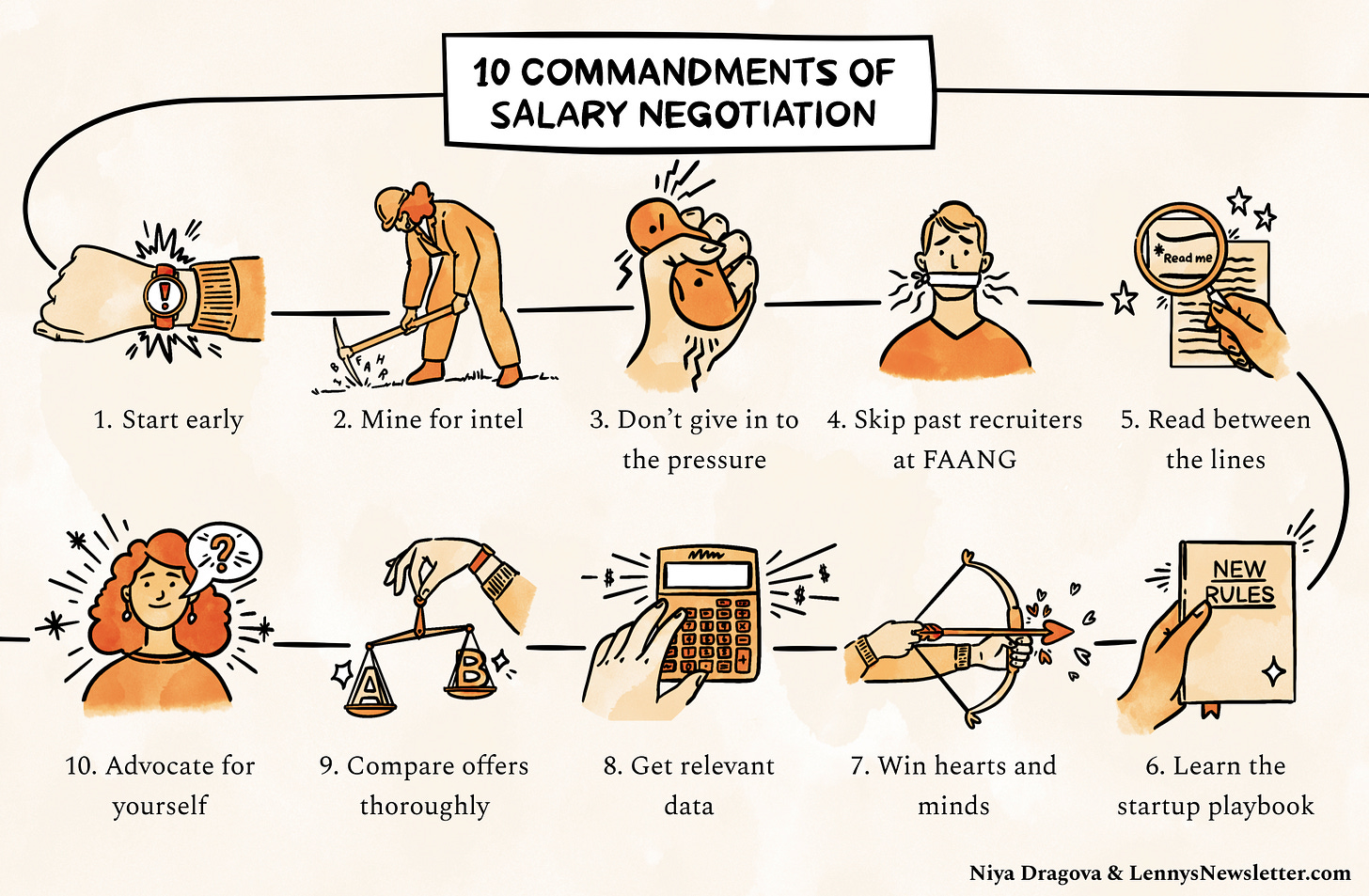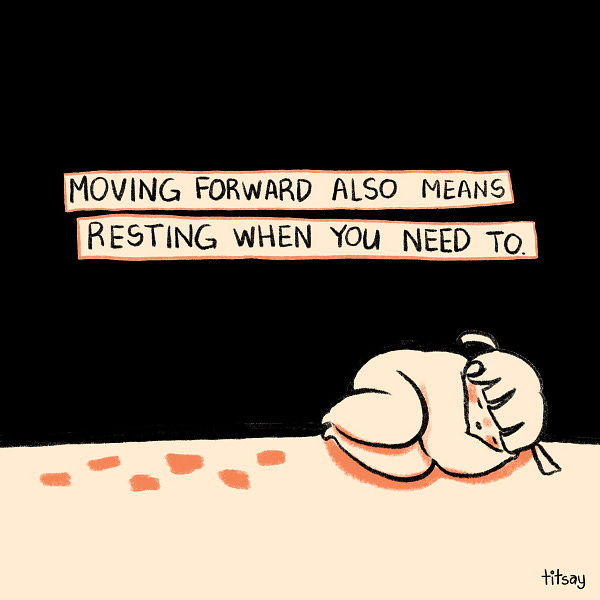Why you need to ask for more money at work
Asking for a raise is never easy.
Happy Tuesday! 👋🏽 A warm welcome to my new subscribers and a huge thank you to my old ones for sticking around while I took an impromptu hiatus to figure out how to make this newsletter better. So I'll be in your inboxes every Tuesday instead of Friday from now, and I hope you'll stick around as I test the best times to send this out.
I appreciate you and the opportunity to be in your inbox. 💌
With Halloween right around the corner, I wanted to talk about something most of us find scary — asking for more money at work.
Money talks are always controversial. The last time we spoke, so many of you wrote to me saying you'd have loved the opportunity to know how much your colleagues or friends make, aid with your own negotiations, and know if you're being paid fairly without being shamed for it.
Today, we're taking it up a level. More than just talking about money, we're going to explore why it's okay (and necessary) to ask for more money at work and why you should probably do it more often.
Gender reveal(s) a huge pay gap
The other day, I read Indra Nooyi's interview with the New York Times. For those unfamiliar with her — Ms. Nooyi is Pepsi's former CEO and one of the world's most powerful women. I found particularly interesting in the article that she said she never asked for a raise at work. She finds it "cringeworthy" and said she couldn't imagine working for someone and telling them the money isn't enough.
Even though she says that this is just her, there's nothing gendered in her decision to not ask for a raise, I can't help but bring gender into this. Millions of women around the world look up to women like her and expect them to be fighting the good fight — breaking the glass ceiling, reducing the wage gap, and more.
To call asking for more money cringeworthy, even as women continue to be paid less than their male counterparts, seems a bit tone-deaf to me. But we're not making this personal.
Women of colour make even less than white women, which isn't for lack of asking, as old studies have indicated. Previously, we were led to believe that women have historically been too timid, too conscious, or too whatever to ask for raises, that's why they weren't given any.
Here's the kicker — Harvard recently found "that women do 'ask' just as often as men. They just don't 'get.'"
So, contrary to popular belief that women don't tend to negotiate as often as men, the problem is actually more systemic. Taking a step back to consider this from another perspective — most women don't feel like they're taken seriously enough at work or have enough power to command a raise. That speaks to the kind of environment they work in and how much their employer supports discussions about money.
73% of women haven't asked for a raise during the pandemic, compared to 58% of men. Over the course of their lives, women will make almost $900,000 less than their male counterparts.
If you're compensated fairly for your work, that's great! I sincerely hope that you're doing your part and exploring money openly at the workplace when you can so your colleagues also know how much their work is worth.
But the reality is probably this — most of the people I know are overworked and underpaid. Even with the Great Resignation, good, well-paying jobs are challenging to get. So whenever you see an opportunity to ask for a raise, you need to go for it.
Fair pay and compensation also make space for women, people of colour, LGBTQIA+, and other marginalized identities at the table. It makes the table more accessible in the first place and offers representation to those who need a boost due to systemic problems.
We need money to work better
It won't ever be easy to ask for more money, but the more times you do it, the more confident you'll get and the less nervous you'll be.
Asking for more isn't shameful, even if it may seem so. When you associate money with morals, you could feel icky about asking for more. You may not want to give off the impression that you're only a part of your company for the pay. But like it or not, money is essential — you need it to live. That means it plays a massive role in keeping you around at your current company.
People in creative jobs often face the dilemma of asking for more vs feeling like they're reducing their output to money. While I understand where that comes from, creativity can only be fueled through proper tools, learning, rest, and all other things that only money can buy.
"Spending more time resting and less time actively engaged in work not only boosts creativity and the ability to problem-solve, but it also makes the time actually spent on work more efficient." — Max Franzel.
My logic is pretty simple. When you're paid enough at work, you won't feel the need to take up a second job (or third job or side hustle). Also, if you aren't dead tired after working an inhuman number of hours, you'll perform better whenever you work.
Being paid enough means you have the time and space to rest — this improves your well-being, and you're likely to be more productive at work.
Better pay = more rest = higher productivity.
When it comes to freelancing, asking for "more" money is pretty much an everyday thing. But that doesn't mean it's any easier to do. Most freelancers raise their rates with new clients or after a set amount of time with any long-term clients.
Over time, you pick up new skills, train yourself to be an expert at the services you provide, and put in the time and effort to support your clients — the raise in rates shows clients that you value your growth.

In all the time I've been freelancing, I still have a pit in my stomach whenever I raise my rates or ask for a higher amount. But if you don't ask, you're leaving money on the table — money that was probably allocated for you anyway.

This is the case for full-time work too. Don't you find it funny that companies will quickly find it in their budgets to match a much higher salary a new place offers you? But, before that, you get a measly 2-4% appreciation in your paycheck that doesn't even cover inflation rates.
It's okay to like money and want to be paid better
I said what I said. So did Wudan Yan, who is very vocal about building a money mindset and being open about money with others.
Most of us aren't too greedy — we don't want inexcusable amounts of money. We just want enough to be comfortable and secure in a volatile economy.
Society has reduced a neutral asset, something we all depend on to survive, to good or bad (depending on who has it).
Asking for more money is not cringe-worthy or shameful. Make it a point to negotiate your salary when you start a new job or ask for a raise whenever you think you're due. In fact, maybe a little before you think you deserve it because most of us can't accurately pinpoint how much we should be paid anyway.
Remember to always ask for more money when you can (and should).
What did you think of this issue?
Click on a link to anonymously share your feedback!
💜 Liked it - 😶 Was okay, nbd - ❌ Didn't like it
Get that coin, y’all! 💰
Here are some resources on how to ask for more money now that we’ve covered the “why” —
The better you become, the more you should earn. This is a neat article about how to protect your time, work better, and charge more for creative work.
Got a new job? Congratulations! Don’t forget to negotiate your salary (even if you hate conflict).
Pitching to an editor? Here’s how to get a better rate straight from an editor’s desk.
Asking for better pay also means you have to stop doing free work (that you don’t want to). Here are a few ways to decline all those “work for exposure/experience” requests.
Once again — negotiate, negotiate, negotiate.
Bonus: Here’s my previous issue that explores why we need to talk about money more openly and how it benefits all of us in the long run.
Weekly faves! 💌
Small steps can lead to big success. Here’s a useful article that puts that into practice — 10 little things you can do to get 1% better every day.
Negotiating with someone from a different country? These country-specific negotiation tactic charts will help you adapt to get the best results.
The internet is a huge place. Here’s what happens on the internet every minute in 2021.
One more for the list of underappreciated contributions made by women to our life:
Finally, here’s your reminder to take care of yourselves.
Please tell a friend or two if you liked this edition of Perceptive Madness or buy me a coffee to encourage me.
Don’t forget to heart the issue (right at the top or right under this). ❤️
See you next week!








Yay! I was so happy when I saw the email today! This was an uplifting and a very much required edition and I really liked it. There were so many wonderful insights about wanting more money to be able to be comfortable and not worry too much. It's not something that I've read or heard so openly and I'm glad you wrote it.
Also I'm super glad you're back. Your emails will definitely make my Tuesdays better, that's for sure.